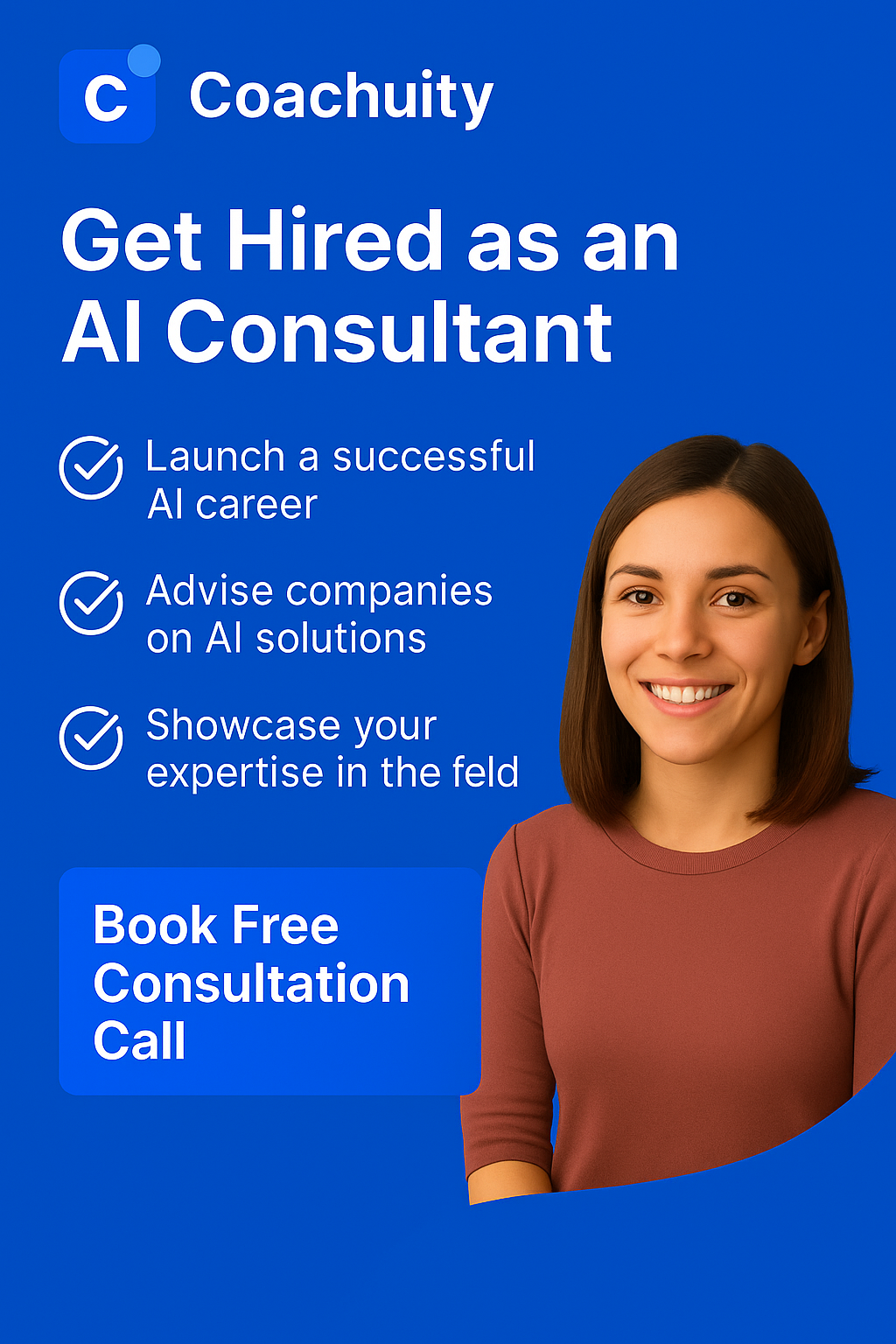
How to Offer AI Solutions to Businesses: A Step-by-Step Guide for Consultants and Entrepreneurs
![]() August 09, 2025
August 09, 2025
Artificial Intelligence (AI) is no longer an emerging trend—it’s a business necessity. From predictive analytics that forecast market shifts to chatbots that deliver 24/7 customer support, AI is transforming industries worldwide. Businesses of all sizes are looking for ways to harness its power, yet many struggle to understand how to integrate AI into their operations effectively. If you want to position yourself as a trusted professional who helps businesses unlock the potential of AI, you need more than just technical knowledge—you need a clear strategy for offering AI solutions that deliver measurable value. This guide will walk you through how to offer AI solutions to businesses, even if you’re not a programmer, covering the essential skills, processes, and strategies to succeed. AI adoption is growing rapidly, but there’s a gap between awareness and implementation. Many businesses: Know AI exists but aren’t sure how it applies to their industry. Fear high costs or complex integrations. Lack in-house expertise to lead AI projects. Need help aligning AI technology with business goals. This creates a significant opportunity for consultants, entrepreneurs, and service providers who can offer clear, business-focused AI solutions. By positioning yourself as an AI solutions provider, you can: Help businesses save time and reduce costs. Improve decision-making with data-driven insights. Enhance customer experiences. Increase operational efficiency and profitability. Before offering AI solutions, you must understand AI concepts in a way that connects to business needs. This includes: Machine Learning – Predicting trends, automating decisions. Natural Language Processing – Chatbots, sentiment analysis. Computer Vision – Quality control, product tagging. Predictive Analytics – Sales forecasting, risk assessment. Instead of diving deep into coding, focus on explaining these concepts in clear, simple language that decision-makers understand. Businesses are more likely to invest in AI when they see a direct link to results. Research and present AI use cases that: Solve existing problems. Generate measurable ROI. Are achievable with their current resources. Examples: Retail: Personalised product recommendations to boost sales. Healthcare: Automating patient data entry to reduce admin costs. Marketing: AI-powered campaign optimisation for higher conversion rates. Manufacturing: Predictive maintenance to reduce downtime. Successful AI solution providers follow a repeatable process. Your framework might include: Discovery Phase – Assess the client’s challenges, processes, and data. Solution Design – Match the right AI tools to their business objectives. Implementation Plan – Outline steps, timelines, and responsibilities. Performance Measurement – Define success metrics and track ROI. Ongoing Support – Provide maintenance, updates, and training. This structured approach shows professionalism and builds trust with clients. You don’t have to build AI tools yourself. Partnering with established AI software providers can help you: Offer ready-to-use AI solutions. Reduce development costs. Leverage proven technologies. Access training and technical support. Examples of platforms you can integrate into your solutions: Google Cloud AI Microsoft Azure AI IBM Watson OpenAI APIs Salesforce Einstein One of the most common mistakes in offering AI solutions is focusing too much on technical capabilities. Businesses want to know: How will AI increase revenue? How will it reduce costs or save time? How will it improve customer satisfaction? Instead of saying, “This tool uses natural language processing,” you might say, “This chatbot can reduce your customer service workload by 40%, allowing your team to focus on high-value tasks.” Pricing models can vary depending on your business structure: Project-Based Pricing – For defined AI implementation projects. Retainer Models – For ongoing AI strategy and optimisation. Value-Based Pricing – Based on the ROI delivered to the client. Always align pricing with the perceived value of the solution rather than just your time spent. Clients are more likely to trust you if you can demonstrate past results. Even if you’re new, you can: Work on pilot projects. Create hypothetical case studies based on real-world examples. Collect testimonials from early clients. Show tangible results such as percentage increases in sales, time saved, or costs reduced. AI adoption often requires cultural and operational changes. Include training sessions and change management strategies in your service offering to: Ensure smooth implementation. Help employees feel confident using AI tools. Maximise adoption rates. By following these steps, you position yourself as a valuable partner to your clients. Benefits include: High Demand – AI consulting is a fast-growing field with global opportunities. Diverse Client Base – AI is relevant across industries, from finance to retail. Scalable Income – Package AI solutions for multiple clients and industries. Future-Proof Skills – Stay relevant in a rapidly evolving job market. Offering AI solutions isn’t limited to tech experts. This opportunity is open to: Business consultants who want to expand their service offerings. Marketing professionals interested in AI-powered analytics and personalisation. Entrepreneurs looking to launch a niche AI services business. Project managers and analysts who understand process improvement. Industry specialists who see AI opportunities in their field. If you have problem-solving skills, business acumen, and the willingness to learn, you can succeed. With the right approach, you can: Establish yourself as a trusted AI advisor. Build long-term client relationships. Launch your own AI consulting business. Create packaged AI services for recurring revenue. Collaborate with technology providers for joint ventures. Some professionals even move into specialised AI niches, such as AI in healthcare, AI in supply chain management, or AI in marketing automation. The global AI market is projected to grow exponentially over the next decade. Businesses that fail to adopt AI risk falling behind their competitors. This creates a perfect window of opportunity for skilled AI consultants and solution providers to establish themselves before the market becomes saturated. You don’t need to be a coder to offer AI solutions—you need the right approach, a clear framework, and the ability to connect AI capabilities to business goals. Our AI Consulting Mentorship and Training Programs provide everything you need to start offering AI solutions to businesses, from foundational AI knowledge to client acquisition strategies. Enroll now and learn how to: Identify profitable AI opportunities. Develop AI strategies for clients. Confidently pitch and deliver AI solutions. Build a sustainable consulting business in the AI space.How to Offer AI Solutions to Businesses: A Step-by-Step Guide for Consultants and Entrepreneurs
Why Businesses Need AI Solutions
Key Steps to Offering AI Solutions to Businesses
1. Understand AI in a Business Context
2. Identify High-Impact Use Cases
3. Build a Consulting Framework
4. Partner with AI Technology Providers
5. Learn to Communicate Value, Not Just Features
6. Price Your AI Solutions Strategically
7. Build Credibility with Case Studies and Testimonials
8. Offer Training and Change Management
Benefits of Offering AI Solutions to Businesses
Who Can Offer AI Solutions?
Potential Outcomes for AI Solutions Providers
Why Now Is the Best Time to Start Offering AI Solutions
Your Next Step: Start Offering AI Solutions Today
